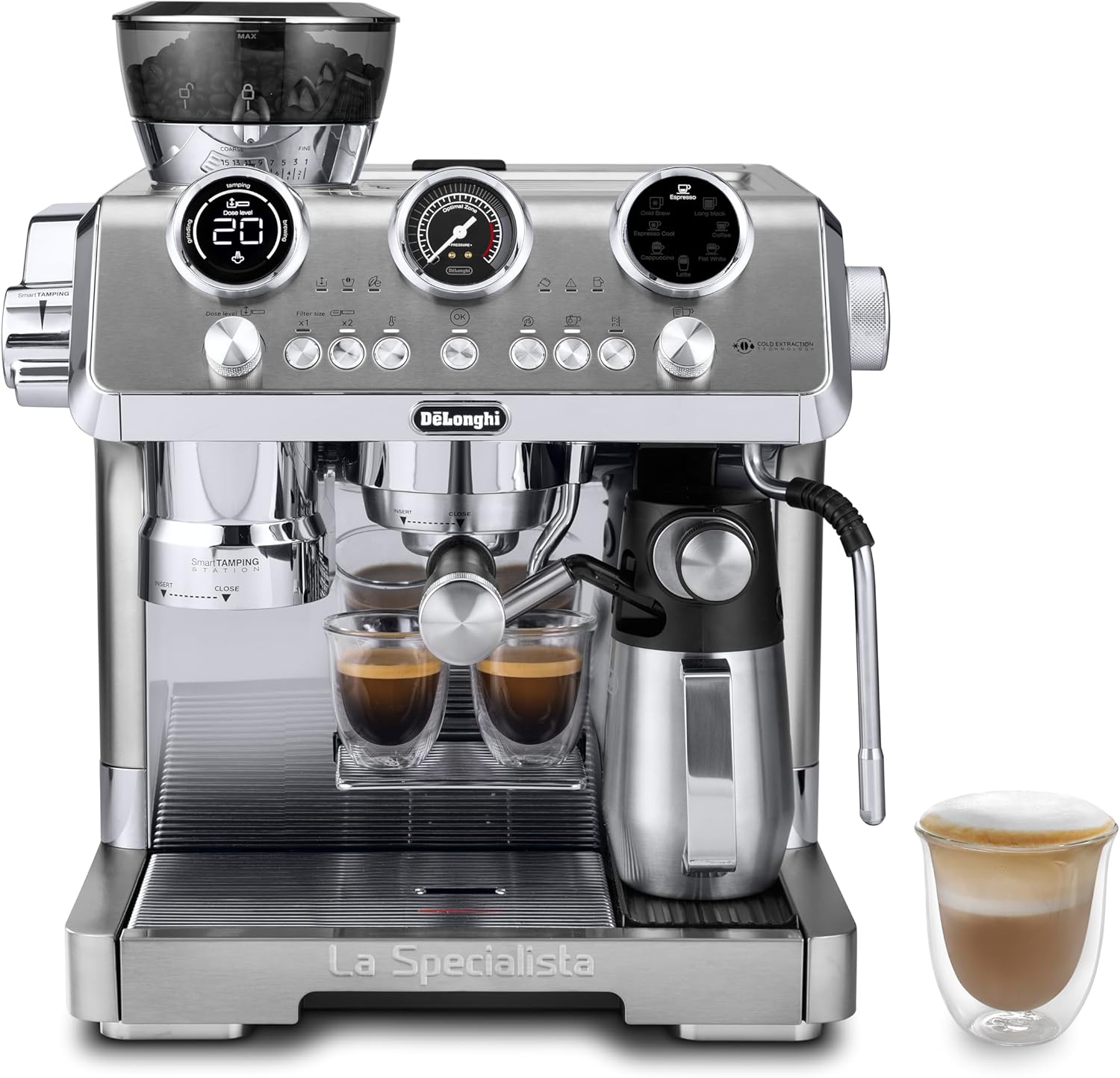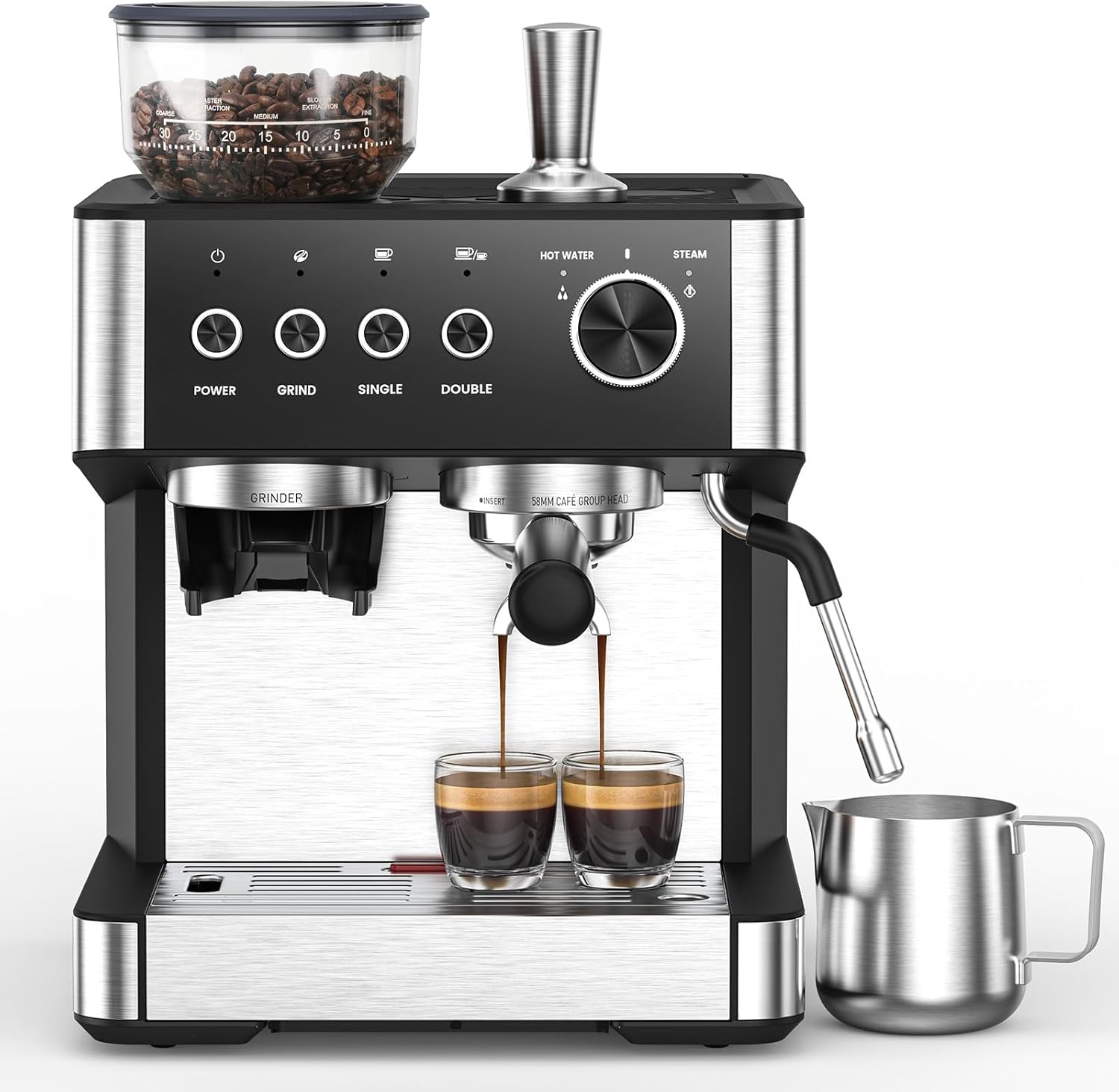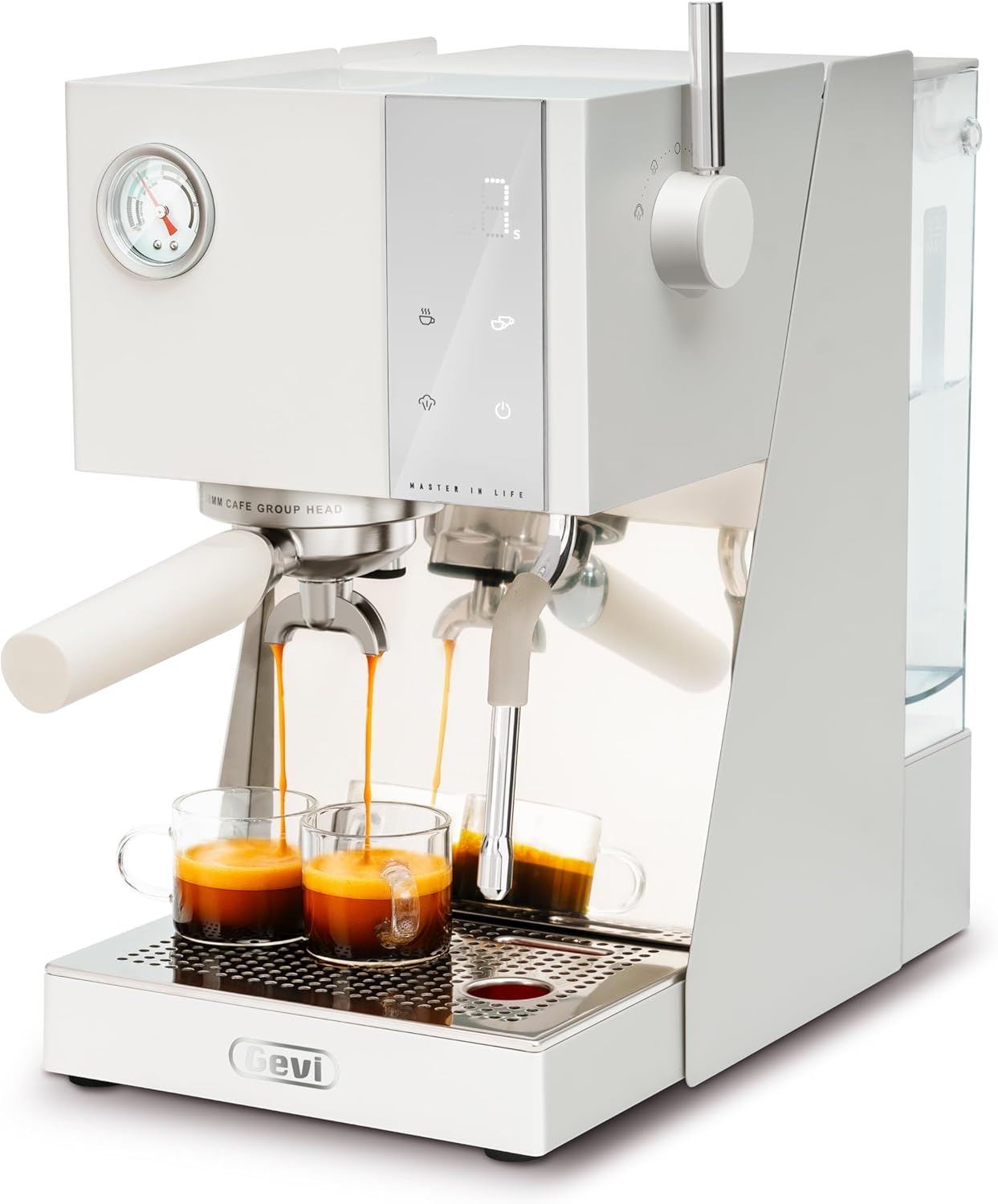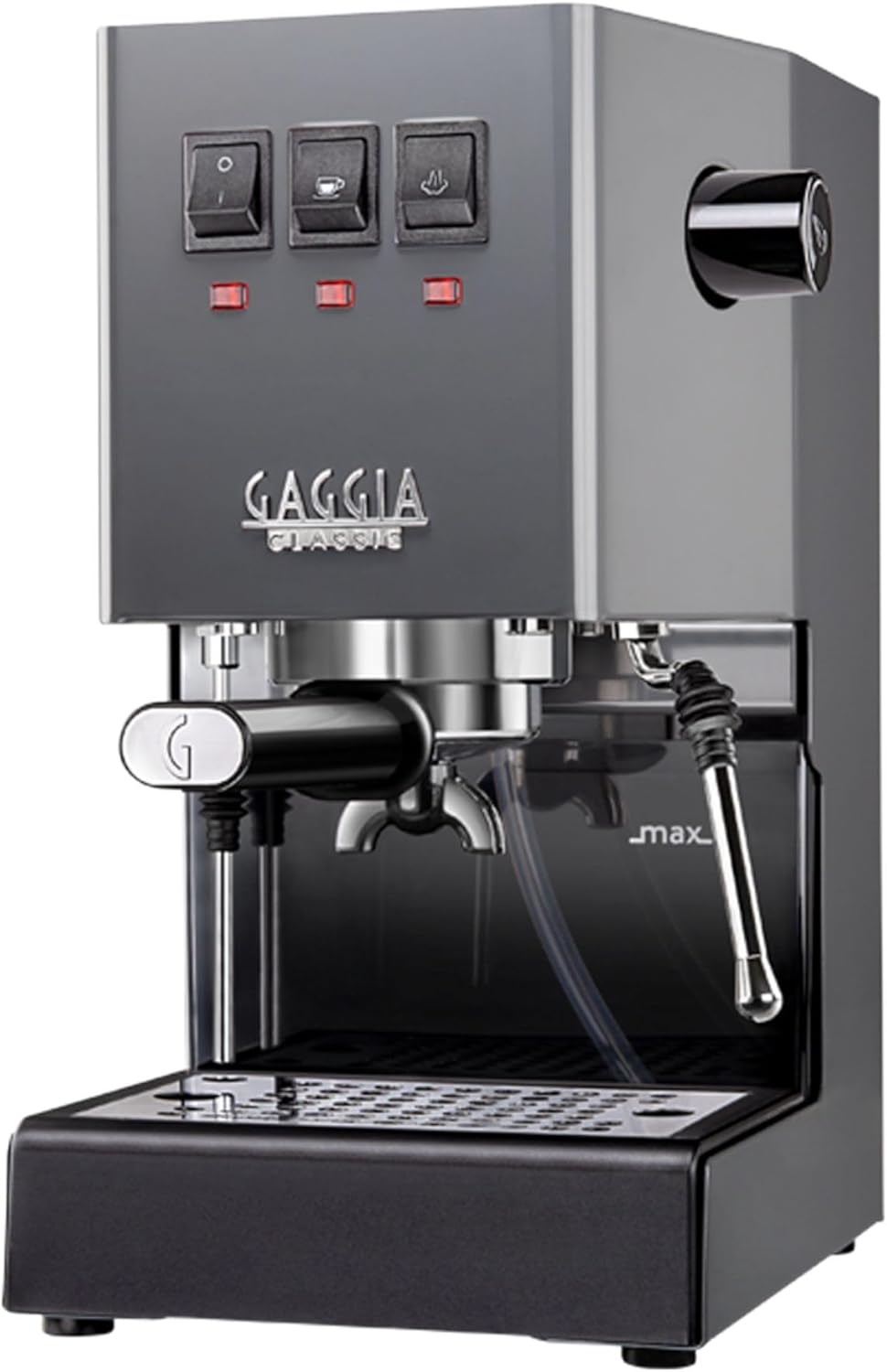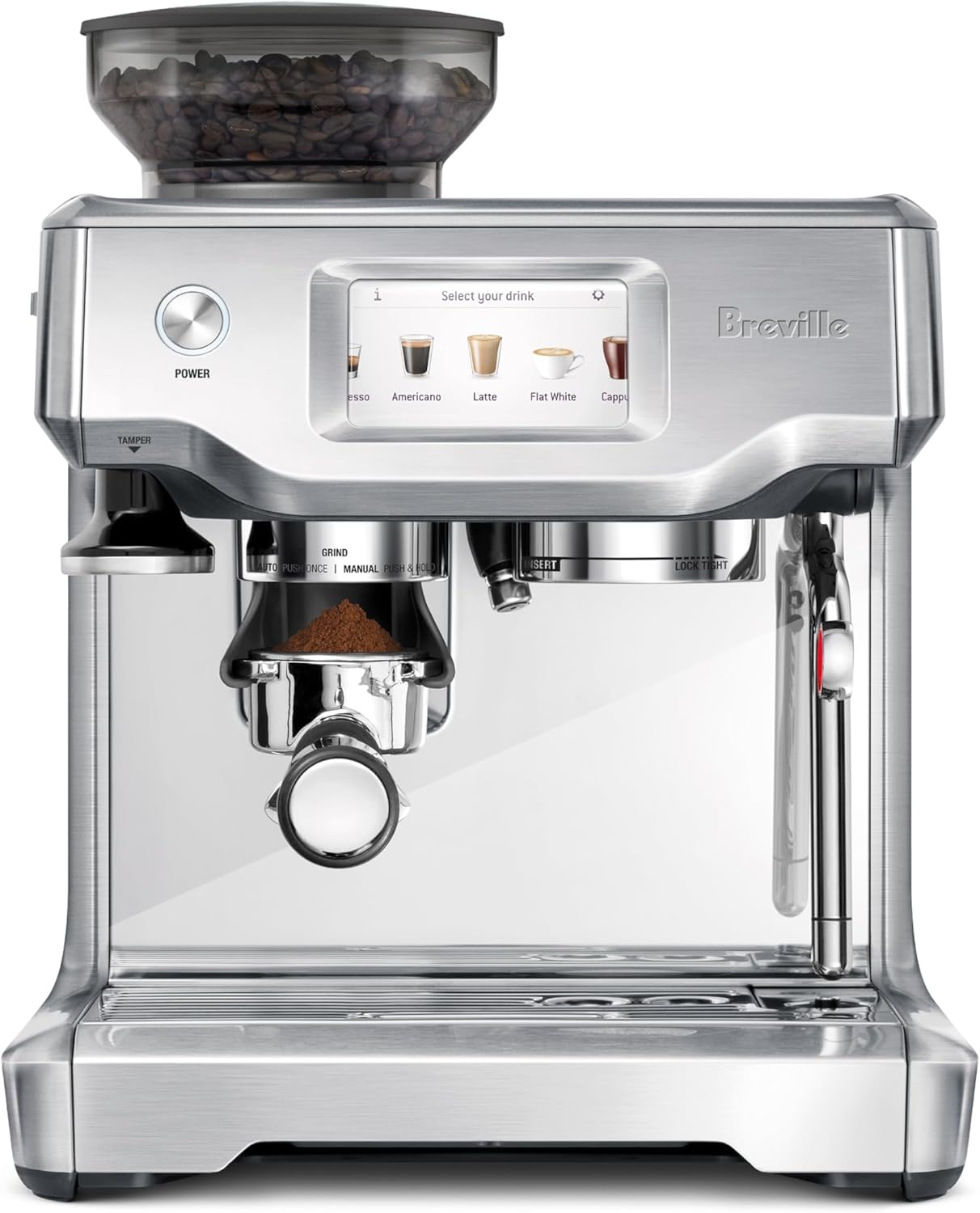Here’s an overview of the Best Commercial Espresso that we’ll explore today:
Commercial or high-variance home-use espresso machines sit at the intersection of performance, usability, and durability. For enthusiasts who want cafe-quality drinks without frequent trips to a shop, choosing the right machine means understanding workflow, build quality, and how features like built-in grinders, temperature control, and pressure profiling translate to real-world results. In this review, I test and compare five machines spanning a budget option to a top-tier model, focusing on grind control, temperature stability, pressure integrity, milk technique, and overall value. My methodology includes hands-on evaluation of setup, extraction consistency, steam performance, ease of cleaning, and long-term maintenance considerations. The lineup covers Gevi, Electactic, Breville, Gaggia, and De’Longhi to reflect a range of price points and feature sets.
1. De’Longhi La Specialista Maestro Espresso Machine with Grinder
- Brand: De’Longhi
- Manufacturer: De’Longhi
Overview: The La Specialista Maestro combines a built-in grinder with Smart Tamping Technology, a 19-bar Italian pump, and Active Temperature Control across five infusion temperatures. It also offers Automatic Frothing with LatteCrema and a manual milk wand option for latte art. Price at $999.95 places it in premium territory, targeting users who want bean-to-cup convenience and precise control without a commercial-grade footprint.
Performance and use cases: The integrated grinder with 15 grind settings supports consistent dosing for single or double shots, while the Smart Tamping Technology reduces variability in tamp pressure. The 9-bar-to-9-bar range during extraction is supported by a stabilized 19-bar pump, and the five temperatures enable tailoring to bean origin and roast. The dual milk options—the automated LatteCrema system and a manual steam wand—cover both quick, consistent drinks and craft-focused milk textures. With a 14″-deep footprint and 35.3 lb mass, it fits in smaller cafe setups or serious home bars but requires careful countertop planning. Maintenance includes routine cleaning tabs, a hard-water test, and grinder upkeep to avoid clogs from specialty beans.
Pros
- Built-in grinder with 15 precise grind settings
- Smart Tamp technology yields consistent extraction
- Active Temperature Control with 5 infusion temps
- Dual milk options: automatic frothing and manual wand
- 9-bar stable extraction with 19-bar pump
Cons
- High price for a semi-automatic with integrated grinder
- Large footprint for compact kitchens
- Learning curve to optimize tempering and temp profiles
2. (2025 Upgrade) 20 Bar Espresso Machine with Built-in Anti-Clog Coffee Grinder
- Brand: Electactic
- Manufacturer: Electactic
Overview: Electactic’s CM8031 delivers a semi-automatic setup with a built-in grinder, 58mm commercial portafilter, and a 20-bar pressure system, rated for a wide range of drinks from espresso to milk-based beverages. Priced at $339.99, it targets entry-to-midlevel users seeking commercial-leaning features in a home-friendly package.
Performance and use cases: The 20-bar system with an upgraded grind path and 58mm portafilter supports even extraction and generous crema, while a detachable drip tray and 2.8-liter water tank simplify maintenance in busy setups. The machine’s microfoam capability and stainless steel build provide durability and consistent frothing for latte art. Real-time monitoring via the touch display helps beginners dial in shots, though the semi-automatic workflow requires more hands-on involvement than a fully automatic machine. Given its weight and dimensions (11.5″D x 13.03″W x 16.1″H, 18.04 lbs), it fits on most counters but is less forgiving in small kitchens with limited clearance.
Pros
- 20-bar pressure with upgraded grind path for jam-free operation
- 58mm commercial portafilter improves extraction evenness
- Semi-automatic with real-time monitoring and display
- Detachable water tank and easy cleaning design
- Solid microfoam capability for latte art
Cons
- Semi-automatic requires skill to maximize consistency
- Relatively compact power? may need steady routine maintenance
- No dedicated pre-infusion pressure profiling
3. Gevi Commercial Espresso Machine 20Bar with Smart OPV Coffee Makers
- Brand: Gevi
- Manufacturer: Gevi
Overview: Gevi’s ECMN0-WH0A1 is a budget-friendly 20-bar machine with a 58mm commercial-grade portafilter, dual-display real-time monitoring, and a PID + NTC dual temperature control. At $299.99, it targets beginners or value-focused users who want a capable semi-automatic with robust temperature and pressure control.
Performance and use cases: The PID/NTC dual temperature control offers selectable brew temps (92–96°C), enabling better extraction consistency across beans. The three-way solenoid and over-pressure valve help prevent over-extraction, and the 58mm portafilter supports even grounds distribution. The machine’s semi-automatic operation with a touchscreen interface and real-time monitoring makes it approachable for home users who want barista-level control without a café-grade price tag. Weight is moderately heavy for a budget unit (21.6 lbs), necessitating stable placement for vibration during extraction.
Pros
- 58mm commercial-grade portafilter for even extraction
- PID + NT C dual temperature control with multiple presets
- Over Pressure Valve for consistent extraction
- Touchscreen real-time display and monitoring
- Budget-friendly at $299.99
Cons
- Build and components are not as heavy-duty as premium options
- Limited after-sales service options compared to major brands
- Minimal brand ecosystem and accessories
4. Gaggia RI9380/51 Classic Evo Pro Espresso Machine
- Brand: Gaggia
- Manufacturer: Gaggia
Overview: Gaggia’s Classic Evo Pro is a compact, steel-housing semi-automatic with a 58mm commercial portafilter, 9-bar extraction pressure, and a commercial-style steam wand. Priced at $536.84, it emphasizes durability and traditional espresso workflow with a classic Italian heritage.
Performance and use cases: The 9-bar extraction profile is a nod to traditional lever and commercial machine tendencies, offering a straightforward approach to shot quality with a steady, forgiving workflow for home baristas. The commercial three-way solenoid valve and self-serviceable design facilitate maintenance, while the compact dimensions (8″D x 9.5″W x 14.2″H) keep it on smaller countertops. Milk texturing relies on the steam wand, which may require practice to achieve microfoam for latte art. Given its age and still solid rating, it remains a reliable entry into semi-professional espresso crafting.
Pros
- Solid steel housing with Italian heritage
- 58mm commercial portafilter and three-way solenoid
- Compact footprint with solid build quality
- Self-serviceable design for user maintenance
- Good value for a commercial-style setup
Cons
- 9-bar extraction is lower than high-end home machines
- Steam wand may require technique refinement for microfoam
- Fewer modern automation features than newer models
5. Breville Barista Touch Espresso Machine BES880BSS
- Brand: Breville
- Manufacturer: Breville
Overview: Breville’s Barista Touch is a high-end home machine that integrates a built-in grinder, dose control, ThermoJet heating, PID temperature control, and an automatic milk texturing system with a responsive touch screen. However, the price for this model is not listed in the provided data, reflecting Breville’s premium positioning and frequent market-driven fluctuations.
Performance and use cases: The integrated grinder with dose control and 3-second heat-up enables fast, consistent preparation from bean to cup. The low-pressure pre-infusion and precise PID control support balanced extractions, while the automatic milk wand and adjustable texture allow quick beverage customization. The 54mm portafilter size and included accessories (clamp, water filter, and cleaning tools) provide a complete ecosystem for home baristas who value convenience and speed. The main caveat is price and ongoing availability, given Breville’s frequent model cycles and potential discontinuations in the lineup.
Pros
- Integrated grinder with dose control for fresh grinds
- ThermoJet heating for rapid preheat and extraction
- Automatic microfoam milk texturing with adjustable settings
- Intuitive touch screen with customizable profiles
- Excellent build quality and support ecosystem
Cons
- Premium price with variable availability
- 54mm portafilter may feel narrower vs. 58mm professional setups
- Some users may prefer full manual control over tamping and grind size
Frequently Asked Questions
We’ve compiled answers to the most common questions about commercial espressos to help you make an informed decision.
Conclusion
.
.
Final thoughts here.

